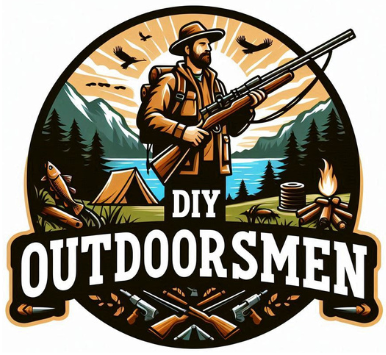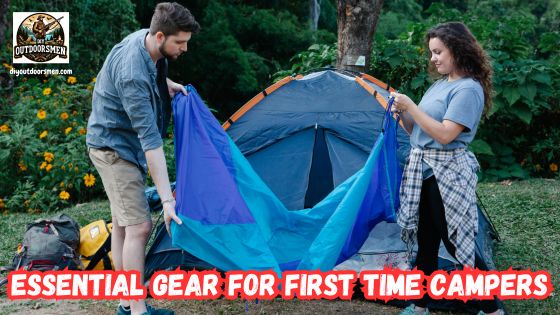Contents
- 1 Essential Gear for First-Time Campers
- 2 Getting Started with Camping
- 3 Considerations Before Your First Camping Trip
- 4 Advanced Tips for a More Enjoyable Camping Experience
- 5 The Basics and Gear to Focus On
- 6 Frequently Asked Questions
- 7 Additional Tips and Considerations
- 8 Preparing Your Mindset for the Outdoors
- 9 Wrapping Up Gear for First-Time Campers
Camping offers a refreshing break from daily routines and allows you to experience nature in a whole new way. For first-time campers, a well-prepared kit can mean the difference between a memorable adventure and an unnecessary struggle.
QUICK LOOK: Gear for First-Time Campers
- Shelter and Sleeping Gear: Investing time in picking the right shelter and sleep gear is a decision that will pay off. It not only protects you from Mother Nature’s surprises but also gives you a soft landing at the end of each day, helping you wake up refreshed and ready for the next adventure.
- Cooking Gear and Food: When planning your outdoor menu, think about ingredients that are easy to prepare and store, and the cooking gear you will need. A little pre-planning in your food and water management not only saves space in your pack but also helps step up your cooking experience with creative and satisfying meal solutions.
- Lighting and Safety Gear: Lanterns, headlamps, flashlights, matches, lighters, and basic safety gear such as a first-aid kit, bug spray, and sunscreen.
- Clothing: You will need to pack for the weather, season, and activities you plan for your camping trip. Include layers, rain gear, and warm clothes for those sudden and unexpected weather changes.
- Other Essentials: Things like camp chairs, camp table, maps of the area, GPS and communications devices, and toiletries will add to your safety and comfort.
I have learned through my own experiences that having the right gear provides comfort and safety while exploring the outdoors. This article explains gear that I believe is essential for your first camping trip and covers important aspects from shelter to safety.
Essential Gear for First-Time Campers
Having the right equipment is a smart way to ensure a comfortable and secure trip. When you are new to camping, the basics are the most important elements. I have put together a list of items that will help you set up a cozy site, prepare meals, and maintain safety during your outdoor adventure.
Shelter & Sleep
- Tent: Choose a tent that is easy to set up and roomy enough to accommodate your group. A reliable tent shields you from the elements and provides a peaceful place to relax after a day of exploring.
- Sleeping Bag: Select a sleeping bag that matches the forecasted temperatures. A bag that suits the weather makes nights comfortable even when temperatures drop substantially.
- Sleeping Pad: A sleeping pad adds insulation and cushioning, ensuring that uneven ground does not detract from your much-needed rest.
- Pillow: A small camping pillow might seem trivial, but it makes a big difference in overall sleep quality and comfort.
Investing time in picking the right shelter and sleep gear is a decision that will pay off. It not only protects you from Mother Nature’s surprises but also gives you a soft landing at the end of each day, helping you wake up refreshed and ready for the next adventure.
Cooking & Food
- Portable Stove: A lightweight stove is ideal for quickly preparing meals. Its ease of use helps simplify cooking when you are outdoors, letting you spend more time enjoying the scenery.
- Cooking Utensils: Bring along pots, pans, and basic utensils. These items cover most cooking needs without requiring bulky equipment, ensuring you can whip up a tasty meal without extra hassle.
- Plates, Cups, & Utensils: Make sure you have enough for everyone in your group. Simple, reusable sets work best for keeping things organized and reducing waste.
- Food & Water: Plan your meals ahead of time and pack enough water for both drinking and cooking. Staying hydrated is a key part of enjoying your trip, so always be well-stocked.
- Cooler: A good cooler keeps your perishables fresh and your beverages cold throughout the day, making your meal times even more enjoyable.
When planning your outdoor menu, think about ingredients that are easy to prepare and store. A little pre-planning in your food and water management not only saves space in your pack but also helps step up your cooking experience with creative and satisfying meal solutions.
Lighting & Safety
- Headlamp or Flashlight: A reliable light source is necessary for navigating your campsite after dark. Hands-free lighting like a headlamp proves especially practical when managing multiple tasks simultaneously.
- Matches or Lighter: These are very important for starting a campfire, provided that fires are allowed in the area where you choose to camp. A few extra fire-starting materials can be a lifesaver during unpredictable weather.
- First-Aid Kit: A basic first-aid kit ensures you can handle small injuries or mishaps that may occur during your trip. It is wise to pack both bandages and antiseptics to be on the safe side.
- Bug Spray and Sunscreen: Protecting your skin from insects and harmful sun rays is very important, especially when you spend long hours outdoors. These items are non-negotiable for a worry-free experience in nature.
Clothing
- Layers: The weather can change quickly outdoors. Packing multiple layers allows you to adjust to varying temperatures with ease, ensuring that you are comfortable at all times.
- Warm Clothes: Even in warmer climates, temperatures can drop in the evening. A set of warm clothing helps you feel secure as the night progresses and provides an extra level of comfort.
- Rain Gear: Unexpected rain is common. Waterproof clothing and a rain jacket keep you dry regardless of sudden weather changes, allowing you to continue enjoying your activities.
- Sturdy Shoes: Comfortable, waterproof shoes are one of the most important investments for a camping trip. They provide stability on rough terrain and keep you safe during evening walks or hikes.
Other Essentials
- Camp Chairs: A couple of lightweight chairs let you relax comfortably around the campfire or during moments of downtime, making your campsite feel like a home away from home.
- Camp Table: If your campsite does not have a picnic table available, a portable camp table helps create a dedicated area for meals or games, ensuring that you have space to socialize and work on projects.
- Trash Bags: Leave no trace. Packing out your trash is necessary both to preserve the environment and to comply with campsite regulations. This simple act goes a long way in protecting nature for future generations.
- Toiletries: Pack travel-sized essentials such as soap, toothpaste, and toilet paper. These small items provide comfort similar to your home environment, making your stay more pleasant even when far from conveniences.
- Paper Maps and Compass/GPS: Mobile service can be spotty in remote locations, which is why traditional maps and a compass or GPS can be invaluable when modern technology fails. They ensure that you can find your way and stay on track during your adventure.
- Games and Activities: If you will be camping for several days, and if you will have kids along, packing some fun games or planning interesting activities will help keep everybody interested and entertained.
Getting Started with Camping
Before you set out into the wild, it is smart to plan out the basic steps of your trip. Knowing your destination and anticipating the demands of the environment help reduce surprises. I have found that a little preparation before the trip leads to greater peace of mind, making your overall experience that much better.
- Evaluate Your Destination: Research the campsite and understand the local conditions. Knowing what to expect in terms of weather, terrain, and available facilities helps in organizing your gear efficiently and makes packing easier.
- Review Weather Forecasts: Check local weather conditions to prepare for changes in temperature and precipitation. It is very important to pack accordingly and have contingency gear handy, ensuring you are ready for any weather surprises.
- Start with a Small Group: If this is your first camping trip, traveling with a small number of people can simplify coordination and reduce stress levels. Smaller groups are often easier to manage, making the trip more enjoyable.
- Practice Setting Up Your Gear: Setting up your tent and using your portable stove at home or in your backyard builds confidence. Practicing these tasks beforehand helps avoid any unexpected difficulties when you are away from home, ensuring a smooth transition into the camping lifestyle.
- Bring Extra Essentials: Items like extra batteries for your flashlight or additional matches add a safety net to your planning. Having backups reassures you during your outdoor stay and helps you handle minor setbacks without stress.
Considerations Before Your First Camping Trip
The idea of camping can be exciting, yet every new experience comes with its own set of challenges. I have learned that considering a few very important factors beforehand helps anticipate potential issues so that you can enjoy the trip without complications or unnecessary stress.
- Weight and Portability: Carrying heavy gear over long distances is tiring. Look for items that are both lightweight and durable, even if they might cost a bit more. The ease of transport is crucial when you travel on foot or need to set up camp in remote areas where every ounce counts.
- Weather Preparedness: Weather can be unpredictable. Ensure that you have layers and protective gear for rain, wind, or unexpected cold snaps. A well-researched weather report and a versatile gear selection help you pack appropriately in advance.
- Safety Considerations: Being safe in a natural setting includes more than just having gear for comfort. I always include a first-aid kit, reliable lighting, and extra fire-starting materials. It is also a good idea to know basic first-aid techniques so you can handle minor injuries or accidents independently.
- Local Regulations and Environment: Some sites have specific rules about fires, waste disposal, and noise. Knowing these regulations in advance helps you avoid unexpected fines and ensures that you are a respectful visitor to nature. This knowledge also gives you a clearer picture of what to expect during your stay.
- Budget Factors: There is a wide range in the cost of camping gear. Focus on high-quality basics that reflect both safety and durability. Over time, you can expand on what you have based on experience and gradually step up your gear collection to match your growing needs.
Equipment Weight
Caring for your physical limits is very important when carrying gear. Lightweight equipment makes it easier to hike to your chosen spot without excessive strain, reducing fatigue over long journeys. I always seek items that balance both weight and functionality. Reading product reviews and recommendations can help you pick gear that has been proven reliable over many trips, ensuring you don’t end up with equipment that slows you down.
Weather Conditions
Weather and temperature are two of the most unpredictable factors outdoors. It is useful to pack items that serve multiple functions, such as a jacket that insulates while repelling water. Moreover, routinely checking weather forecasts before and during your trip helps you adjust your plans as needed. This attention to detail can be the difference between a carefree outing and a challenging experience.
Local Safety and Regulations
Understanding the local rules and environment is a step I never overlook. Local guidelines regarding campfires, waste management, and area restrictions help protect the environment and ensure a hassle-free experience. This approach also aids in planning your daily activities with safety in mind, ensuring that every adventure remains both enjoyable and respectful of nature.
Advanced Tips for a More Enjoyable Camping Experience
As you gain confidence in your camping skills, you may stumble upon options to further step up your trip. These tips come from years of experience and multiple journeys into the wild, and they have helped me create a smoother, more enjoyable outdoor experience.
Meal Planning: Preparing your meals ahead of time can simplify your cooking routine at the campsite. I find that planning menus based on ingredients that are easy to cook outdoors makes meal preparation a breeze. It not only saves time but also lets you enjoy more of the natural surroundings while the food cooks.
Gear Maintenance and Storage: Taking care of your equipment is very important to extend its lifespan. I always clean my stove and check my tent for wear before and after each trip. This simple practice ensures reliability during your adventures and protects your investment over time.
Organization and Accessibility: Keeping your gear well-organized in your vehicle or backpack saves valuable time when you need to locate an item quickly. Whether it is through clearly labeled compartments or a dedicated gear checklist, these strategies help you avoid the stress of scrambling for essentials during critical moments.
Sustainable Camping: Respecting nature is a core element of the camping experience. I make sure to pack out all of my trash and leave my campsite as pristine as I found it. Following sustainable practices not only protects the environment but also sets a positive example for future campers who value our natural resources.
The Basics and Gear to Focus On
When you are new to camping, prioritizing the basics ensures that you do not overcomplicate your setup. I have found that focusing on a few key items lays a strong foundation for any trip. A reliable tent, a correctly rated sleeping bag, and a functional portable stove can make your first camping experience not only safer but also more enjoyable overall.
- Tent: A solid, easy-to-assemble tent creates a protected space and a dedicated base for your camping activities, ensuring a safe refuge from the elements.
- Sleeping Bag: Choose one that reflects the expected nighttime temperatures. This decision is the cornerstone of a good night’s sleep in the outdoors, drastically improving your overall experience.
- Sleeping Pad: An essential piece of gear for providing cushioning against hard or uneven ground, the sleeping pad makes sleep more restful and rejuvenating.
- Portable Stove: An uncomplicated stove simplifies meal preparation and saves vital time and energy during your trip, letting you enjoy nature without fuss.
- Headlamp or Flashlight: Reliable lighting is necessary, especially when natural light fades rapidly in the early evening. A good light source is indispensable for nighttime tasks and unexpected situations.
Frequently Asked Questions
I have encountered many questions about camping gear during my outdoor adventures. The following FAQ section covers some of the most common questions that first-time campers ask, providing clarity and confidence for your upcoming trip.
What gear should I prioritize as a beginner camper?
I recommend concentrating on the essentials like a tent, a sleeping bag, and a portable stove. Focusing on these key items ensures comfort and safety while you learn the ropes of camping.

How do I choose the right tent?
The right tent should easily fit your group size and be simple to set up. Reading product reviews and expert advice helped me choose a tent that meets my needs without unnecessary extras.
What safety items are important for a first camping trip?
Very important safety items include a headlamp or flashlight for illuminating dark areas, a basic first-aid kit for minor mishaps, and extra fire-starting materials. These items serve as a safety net in case of unexpected situations.
Why do I need a sleeping pad?
A sleeping pad provides the insulation and cushioning needed to keep you comfortable on hard or uneven ground. It makes a significant difference in the quality of sleep and overall rest you achieve outdoors.
Additional Tips and Considerations
Beyond the basic gear, it is wise to also think about your overall mindset and additional comforts that can completely change your camping experience. Spending time to research and plan might seem overwhelming at first, but every little detail—from the ease of packing your gear to the methods you choose to cook outdoors—can add up to a much more enjoyable ride.
Taking a few extra minutes to check out local trail maps, reading reviews for new and innovative gear, and even chatting with experienced campers can set you on the right path for a successful outdoor adventure.
Consider keeping a small notebook or a digital journal during your trip. Documenting your experiences, challenges, and memorable moments not only helps you reflect on what works best but also lets you share valuable insights with other camping enthusiasts. This habit can truly step up your future outdoor adventures by helping you remember techniques and gear setups that were most effective.
Preparing Your Mindset for the Outdoors
Entering the wilderness requires more than just the right equipment; it calls for a flexible and positive attitude. Be open to unexpected events and be prepared to think on your feet. Sometimes, not everything goes as planned, and having a problem-solving attitude can make your trip smoother and considerably more enjoyable.
Remain patient, keep a cool head when challenges arise, and use each experience as an opportunity to learn and grow. It is also helpful to plan some leisure time—moments to just sit back and admire the eye-catching natural views, listen to the sounds of wildlife, or even pick up a hobby like stargazing. These quiet moments can be just as rewarding as the planned activities, allowing you to reconnect with nature in a very personal way.
Wrapping Up Gear for First-Time Campers
Preparing for your first camping trip with the right gear is a smart approach to both comfort and safety. The essentials covered in this article—including shelter, sleep, cooking, safety, clothing, and additional thoughtful touches—form the backbone of a successful outdoor experience. Every camping trip is a learning experience that helps refine your choices and planning for future excursions.
The great outdoors has a way of renewing your perspective on life. When you equip yourself with reliable gear and an open mindset geared toward continuous learning, every trip becomes more rewarding.
Enjoy your time in nature, and let your experiences guide you into becoming a confident camper who is always ready to set out on the next adventure. Remember that it isn’t just about packing the gear; it’s about embracing the entire experience, from the planning stages to the quiet moments by the campfire.
Take advantage of every opportunity to learn, ask for tips from seasoned campers, and most importantly, have fun! Your outdoor adventures offer unmatched experiences that foster personal growth and unforgettable memories. Happy camping!
Check Out Our Latest Articles:
- Best Rooftop Tents For Overlanding
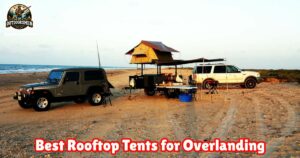
- Overlanding The Infamous Black Bear Pass In Colorado
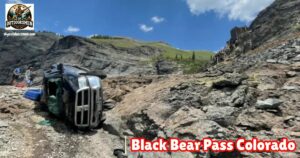
- How To Pack A Lightweight Backpack For DIY Backpack Hunting Trips
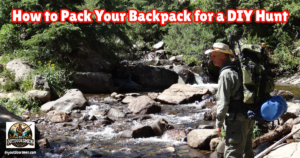
- Navigating The Hunt Application Process In The US

- Kodiak Canvas Cabin Lodge Tent
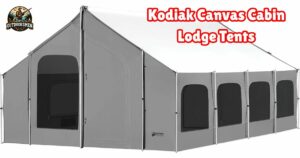
- Safety Tips For Hiking In Bear Country
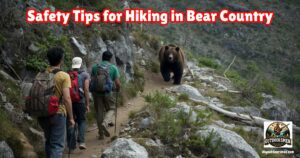
As always, stay safe, enjoy the journey, and please try to leave it cleaner than you found it. If you have any comments, questions, ideas, or suggestions, please leave them in the comment section below, and I’ll get back to you ASAP. You can follow us on YouTube: Man Art Creations for videos of our DIY Adventures.
P.S. Thanks so much for checking out our blog; we really appreciate it. Just so you know, we may receive a commission if you click on some of the links that appear on our site. This helps us keep our content free and up-to-date for everyone. We appreciate your support!
